|
|
|
Sort Order |
|
|
|
Items / Page
|
|
|
|
|
|
|
| Srl | Item |
| 1 |
ID:
152107
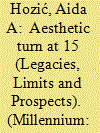

|
|
|
|
|
| Summary/Abstract |
Roland Bleiker’s article ‘The Aesthetic Turn in International Political Theory’ appeared in this journal in December 2001 as part of a special issue on ‘Images, Narratives and Sounds’.1 The article drew a line between mimetic approaches to international relations, which did not ‘pay enough attention to the relationship between the represented and its representation’, and aesthetic approaches, which directly engaged ‘the gap that inevitably opens up between a form of representation and the object it seeks to represent’.2 Arguing that ‘representation is always an act of power
|
|
|
|
|
|
|
|
|
|
|
|
|
|
|
|
| 2 |
ID:
105922
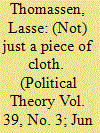

|
|
|
|
|
| Publication |
2011.
|
| Summary/Abstract |
To understand the politics of recognition, one must conceive of it as a politics of representation. Like representation, recognition proceeds at once in a constative and a performative mode, whereby they bring into being what is simultaneously represented or recognized. This structure has paradoxical implications. The politics of recognition is also a politics of representation in the sense that it always involves questions such as, Which representations are recognized? Whose representations are they? The reverse is also true: the politics of representation involves recognition because representatives and representations must be recognized in order to gain authority. In short, we can examine recognition as representation, and there is no recognition without representation, and vice versa. This is demonstrated through a reading of a recent British legal case, Begum, where the issue at stake concerned which representation of Islam should form the basis for the recognition of Islam in the school uniform policy.
|
|
|
|
|
|
|
|
|
|
|
|
|
|
|
|
| 3 |
ID:
181835


|
|
|
|
|
| Summary/Abstract |
While the increase of women in elected office has received much scholarly attention, less attention has been paid to the dynamics of resisting gender quotas in countries that fail to adopt such measures despite regional and international pressure. We develop a context-sensitive typology of affirmative action measures that includes gender quotas and funding incentives and explore determinants of electoral candidates’ positioning in the context of Zambia. Using a sequential mixed-methods approach and unique data, we examine how candidates of different gender, party affiliation, and level of electoral success position themselves when asked to choose between different options. Intriguingly, electoral success and party allegiance – whether a candidate is affiliated with a current or former government party – are more important than gender. This finding is relevant for the debate on feminist democratic representation by showing that candidates are likely to have their more radical views muted when getting into position.
|
|
|
|
|
|
|
|
|
|
|
|
|
|
|
|
| 4 |
ID:
092397
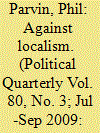

|
|
|
|
|
| Publication |
2009.
|
| Summary/Abstract |
The continued decline in levels of political engagement among British citizens has led many politicians, commentators and academics from across the political spectrum to advocate a move toward a more direct form of democracy via some kind of localism. The claim is that citizens feel increasingly estranged from the democratic process, and from those organisations on which they have historically relied to represent them within the political system. Consequently, localists argue, there now exists a gap between the people, the institutions which are supposed to work on their behalf, and the decisions made in their name, so the system needs to be reformed in such a way as to give individuals and local communities more of a direct input into the decision-making process. Calls for a more direct form of democracy via localism are popular among members of the progressive left and the 'new Conservative' right, and have become so dominant in political discourse that it is often suggested that 'we are all localists now'. This article raises questions about the localist agenda, and suggests that the adoption of a more direct form of democracy in Britain may not only fail to address the decline in political engagement, but may also result in the exclusion, marginalisation, and oppression of minority groups
|
|
|
|
|
|
|
|
|
|
|
|
|
|
|
|
| 5 |
ID:
078779
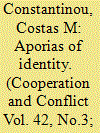

|
|
|
|
|
| Publication |
2007.
|
| Summary/Abstract |
This article examines the predicaments and paradoxes of identity politics in Cyprus. It looks at the historical alliance of colonial practices and nationalist rationales that brought about a static bicommunal system, establishing the basis for inter-ethnic conflict, or what became known as the `Cyprus problem'. The advent of modern governmentality, dividing and classifying the Cypriot population, helped, in addition, to solidify fluid and ambiguous ethno-religious boundaries, making it more difficult for individuals to use ethno-religious identities flexibly and pragmatically, including their use as a tactic to resist the policies of consecutive regimes of power. The article suggests that the 'Cyprus problem' provides a moral alibi for the pursuit of a range of problematic regulations and practices against individuals caught between the dominant ethnic identities, even though there also exist windows of opportunity and resistance on the ground. The article focuses on the genealogy and presence of hybrid communities and syncretistic lifestyles, which complicate and transgress the binary of Greek/Christian versus Turk/Muslim, and the existence of which became progressively abnormalized or exoticized
|
|
|
|
|
|
|
|
|
|
|
|
|
|
|
|
| 6 |
ID:
131895
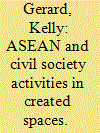

|
|
|
|
|
| Publication |
2014.
|
| Summary/Abstract |
The Association of Southeast Asian Nations (ASEAN) has recently made numerous commitments to engage civil society organizations (CSOs) in its governance practices. However, the opportunities created offer limited means for CSOs to contest policy as a result of strict controls over who can participate and the forms of participation permitted. Activists have consequently pursued their agendas outside of spaces sanctioned by ASEAN through 'created spaces,' such as conferences organized parallel to official summits. However, this form of political participation has limited potential to influence official processes because despite its independence, these activities are still structured in relation to ASEAN practices. The ineffectual nature of CSO advocacy despite ASEAN's people-orientated shift has been documented, however explanations for this trend remain limited. This article applies the modes of political participation framework that acknowledges the role of intergovernmental organizations in structuring spaces for civil society participation and, in doing so, shaping the contribution that CSOs can make. Through an examination of the regulations and practices that govern CSO participation in both ASEAN-sanctioned and independent spaces, it argues that spaces for CSO participation are structured to prevent CSOs from contesting policy, suggesting that ASEAN's shift to widen participation is directed towards legitimating its reform agenda. Hence, ASEAN's claim of becoming 'people oriented' must be considered in recognition of the limiting effect its engagement practices have on CSOs' ability to advance alternative agendas.
|
|
|
|
|
|
|
|
|
|
|
|
|
|
|
|
| 7 |
ID:
160422
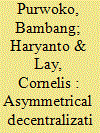

|
|
|
|
|
| Summary/Abstract |
This article discusses the questions of representativeness and legitimacy within the context of the Majelis Rakyat Papua (Papuan People’s Assembly) as an integral part of the Indonesian government’s asymmetrical-decentralization scheme to reduce separatist tendencies in Papua. We find that the MRP has generally failed in its representation and its claim to legitimacy.
|
|
|
|
|
|
|
|
|
|
|
|
|
|
|
|
| 8 |
ID:
132946
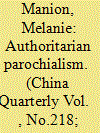

|
|
|
|
|
| Publication |
2014.
|
| Summary/Abstract |
This article draws on evidence from loosely structured interviews and data from original surveys of 5,130 delegates in township, county and municipal congresses to argue that congressional representation unfolds as authoritarian parochialism in China. It makes three new arguments. First, popularly elected local congresses that once only mechanically stood in for the Chinese mass public, through demographically descriptive and politically symbolic representation, now work as substantively representative institutions. Chinese local congressmen and women view themselves and act as "delegates," not Burkean trustees or Leninist party agents. Second, this congressional representation is not commonly expressed in the quintessentially legislative activities familiar in other regime types. Rather, it is an extra-legislative variant of pork-barrel politics: parochial activity by delegates to deliver targeted public goods to the geographic constituency. Third, this authoritarian parochialism is due to institutional arrangements and regime priorities, some common to single-party dictatorships and some distinct to Chinese authoritarianism.
|
|
|
|
|
|
|
|
|
|
|
|
|
|
|
|
| 9 |
ID:
172652
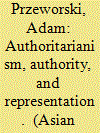

|
|
|
|
|
| Summary/Abstract |
Representation is always a dynamic relation, a tatonnement, in which the represented adjust their preferences on the basis of beliefs induced by the representatives. All rulers—those selected in clean elections, those who hold such ceremonies without putting their power at stake, and those who do not even bother to hold them—claim to have reasons to be followed, and people are willing to follow them if they believe these are good reasons. Thus, individual preferences, “wills,”are influenced by the relation of representation. The controversial issue is whether the relation of representation can be assessed when preferences are endogenous, in particular when people are not exposed to a plurality of reasons.
|
|
|
|
|
|
|
|
|
|
|
|
|
|
|
|
| 10 |
ID:
117909
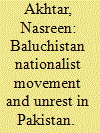

|
|
|
|
|
| Publication |
2011.
|
| Summary/Abstract |
Pakistan is one of the most complex multi-ethnic societies in the developing Islamic world. Each of the ethnic groups that now comprise Pakistan has very distinctive identity, folklore, history and political interests. However, Pakistan's nation builders were not alive to the ethnic question and failed to integrate ethnic groups into a Pakistani nationhood through recognised principles of autonomy, representation and empowerment. Instead, a non-representative, military-led authoritarian system suppressed legitimate regional and ethnic aspirations, relying too heavily on Islam and Pakistan ideology (two nation theory) to forge a sense of common nationhood. It didn't work: since the 1950s there have been four major insurrections against the central government by Baluch nationalists. Although the Baluch national question has its roots in the colonial era, it emerged as a significant political and security issue because an over-centralised and non-representative power system couldn't address the issue of ethnic diversity. Baluchistan is now a hub of interests for regional and major powers.
|
|
|
|
|
|
|
|
|
|
|
|
|
|
|
|
| 11 |
ID:
170478
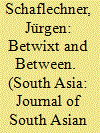

|
|
|
|
|
| Summary/Abstract |
The following article introduces Pakistan’s Hindu community and shows how the group represents itself through and within the country’s public spheres. In a first step, the paper reveals the ways in which Hinduism and its followers are portrayed in government schoolbooks, Urdu pulp fiction and religious literature. Through such media, the category ‘Pakistani Hindu’ emerges as caught between religious and nationalist discourses. In a second step, the paper analyses the Pakistani Hindus’ ways of becoming public within such an environment. Utilising Michael Warner’s work on public spheres, I will suggest calling Hindu engagement with the public in Pakistan ‘wary and aware’ performances.
|
|
|
|
|
|
|
|
|
|
|
|
|
|
|
|
| 12 |
ID:
111532
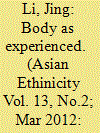

|
|
|
|
|
| Publication |
2012.
|
| Summary/Abstract |
This article looks at the filming of the Dai river bathing custom by the media professionals for tourism promotion in Xishuang Banna, China. It speaks to the previous scholarships that have studied the Otherness of ethnic minorities in China's mainstream and popular representations. Yet this case contextualizes this issue in the era of China's domestic tourism, when ethnic cultures and bodies are increasingly put on display, experienced, and (re-)produced through individualized, immediate, embodied encounters in tourist zones. By taking embodied experiences to the center, this article studies the touristic representation of ethnic minorities as China's national Others from an angle of embodiment. It inquires how the embodied experiences of both media professionals and Dai bathers at the filming constitute the very process during which Otherness, difference, and selfness are perceived, actualized, and (re-)produced in localized reality and at the grassroots level.
|
|
|
|
|
|
|
|
|
|
|
|
|
|
|
|
| 13 |
ID:
175137


|
|
|
|
|
| Summary/Abstract |
Media researchers have often examined how film and television can have an impact on audiences. Media have various effects on audience members. When it comes to representing ‘the other’, the media often rely on stereotypes. Research has shown that ethnic Arabs are under-represented in US film and television, and their depictions are distorted with stereotypical portrayals. The current study joins the discussion on ‘media representation’ (in this case, informed by the construct of Occidentalism) by conducting a qualitative, thematic, content analysis (informed by narrative analysis, both socio-linguistic and socio-cultural) of the Jordanian television show My American Neighbor. Stereotypes can be both positive and negative, and they are often used by media storytellers regardless of their background or location in the World.
|
|
|
|
|
|
|
|
|
|
|
|
|
|
|
|
| 14 |
ID:
180052
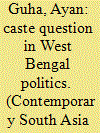

|
|
|
|
|
| Summary/Abstract |
The electoral decline of the organised Left in West Bengal politics has given rise to intellectual speculation about the increasing possibility of caste politics. In this context, this article investigates whether there is any merit in the claim that the electoral decline of the Left Front has paved the way for the rise of caste at the centre stage of mainstream electoral politics in West Bengal. It asks whether lower castes have started to mobilise politically in West Bengal in the same way as in many other states. The article argues against the claim of ‘a new politics of caste’ in West Bengal by showing that the electoral decline of the Left Front has not been accompanied by any rise in lower caste representation. In this context, the article also attempts to understand the reasons for the continuing non-politicisation of caste in West Bengal, revealing many factors relating to demography and political economy which don’t augur well for caste politics in West Bengal.
|
|
|
|
|
|
|
|
|
|
|
|
|
|
|
|
| 15 |
ID:
144390
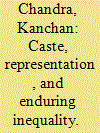

|
|
|
|
|
| Summary/Abstract |
“Although the majority of elected members of Parliament in India now come from subaltern categories, they belong to parties that are dominated by the Hindu upper castes.
|
|
|
|
|
|
|
|
|
|
|
|
|
|
|
|
| 16 |
ID:
110548
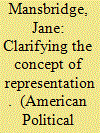

|
|
|
|
|
| Publication |
2011.
|
| Summary/Abstract |
This response to Andrew Rehfeld's "Representation Rethought" (American Political Science Review 2009) takes up his criticisms of my "Rethinking Representation" (American Political Science Review 2003) to advance a more relational and systematic approach to representation. To this end, it suggests replacing the "trustee" concept of representation with a "selection model" based on the selection and replacement of "gyroscopic" representatives who are both relatively self-reliant in judgment and relatively nonresponsive to sanctions. It explores as well the interaction between representatives' (and constituents') perceptions of reality and their normative views of what the representative ought to represent. Building from the concept of surrogate representation and other features of legislative representation, it argues for investigating, both normatively and empirically, not only the characteristics of individual representatives emphasized by Rehfeld's analysis but also the representative-constituent relationship and the larger representative system, including both elected and nonelected representatives, inside and outside the legislature.
|
|
|
|
|
|
|
|
|
|
|
|
|
|
|
|
| 17 |
ID:
146103


|
|
|
|
|
| Summary/Abstract |
The mass franchise led to more responsive government and a more equitable distribution of resources in the United States and other democracies. Recently in America, however, voter participation has been low and increasingly biased toward the wealthy. We investigate whether this electoral “class bias” shapes government ideology, the substance of economic policy, and distributional outcomes, thereby shedding light on both the old question of whether who votes matters and the newer question of how politics has contributed to growing income inequality. Because both lower and upper income groups try to use their resources to mobilize their supporters and demobilize their opponents, we argue that variation in class bias in turnout is a good indicator of the balance of power between upper and lower income groups. And because lower income voters favor more liberal governments and economic policies we expect that less class bias will be associated with these outcomes and a more equal income distribution. Our analysis of data from the U.S. states confirms that class bias matters for these outcomes.
|
|
|
|
|
|
|
|
|
|
|
|
|
|
|
|
| 18 |
ID:
078253
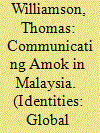

|
|
|
|
|
| Publication |
2007.
|
| Summary/Abstract |
This article analyzes the different messages communicated in Malaysia by violent acts labeled amok. In the colonial period, English-language uses of the term represented the presence of an anti-modern remnant among the peninsula's Malay population, one that led to a medico-legal understanding of individualized violence. Malay-language uses of amok represented, in contrast, the presence of modern changes amid the collective peninsular society. These two vectors of interest combined in the post-colonial period, where amok became a primary ingredient for analyzing Malaysian politics and national security, from the pivotal urban rebellion of May 13, 1969, to the Reformasi protests of 1998. Critically reexamining these representations of amok helps us to rethink the efficacy and power of violent acts in Malaysia and elsewhere.
|
|
|
|
|
|
|
|
|
|
|
|
|
|
|
|
| 19 |
ID:
110549
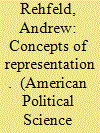

|
|
|
|
|
| Publication |
2011.
|
| Summary/Abstract |
In this reply to Jane Mansbridge's "Clarifying the Concept of Representation" in this issue (American Political Science Review 2011). I argue that our main disagreements are conceptual, and are traceable to the attempt to treat the concept of representation as a "single highly complex concept" as Hanna Pitkin once put it. Instead, I argue, it would be more useful to develop the various concepts that emphasize the underlying forms of representation. Against the view that empirical regularity should guide concept formation, I suggest that the failure to find instances of the cases I conceptualize is not itself a reason to reject them. Instead, I argue in favor of concepts that emphasize one side or other of a relationship, rather than treating both sides simultaneously, defending the view that "promissory" and "anticipatory" may usefully describe the activity of "representing" but ought to emphasize only one side of the representative-voter relationship. I also explain why adding substantive accounts of representation to any of Mansbridge's modifying concepts dilutes their practical value. I conclude by indicating the importance of developing concepts that stretch beyond the democratic contexts that feature prominently in her response.
|
|
|
|
|
|
|
|
|
|
|
|
|
|
|
|
| 20 |
ID:
191704
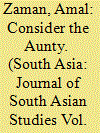

|
|
|
|
|
| Summary/Abstract |
This essay reads the aunties on the peripheries of Hanif Kureishi and Stephen Frear’s film, My Beautiful Laundrette (1985), as minor figures, enacting a methodological turn to the seemingly insignificant in analyses of South Asian culture and sexuality. I ask why the aunties’ desire feels so impossible, especially in a film centred on a Pakistani protagonist’s queer utopia. Both ubiquitous and precluded from a complexity of desire, representations of the Pakistani aunty suffer from a deficit of imagination. Aunties tend to be shown as middle-aged women who surveil and police their kin and have a neutered or absent sexuality, as the film’s paradigmatic figuration of the aunty exemplifies. This article argues that such creative constraint derives from the construction of female sexuality as deviance in South Asia, and then tries to look beyond these constraints. While asking what a more capacious imagining of the aunty and her desires might make possible, I offer parameters for reading sexuality in Pakistan and its diasporas by foregrounding deprivation of pleasure and choice.
|
|
|
|
|
|
|
|
|
|
|
|
|
|
|
|
|
|
|
|
|